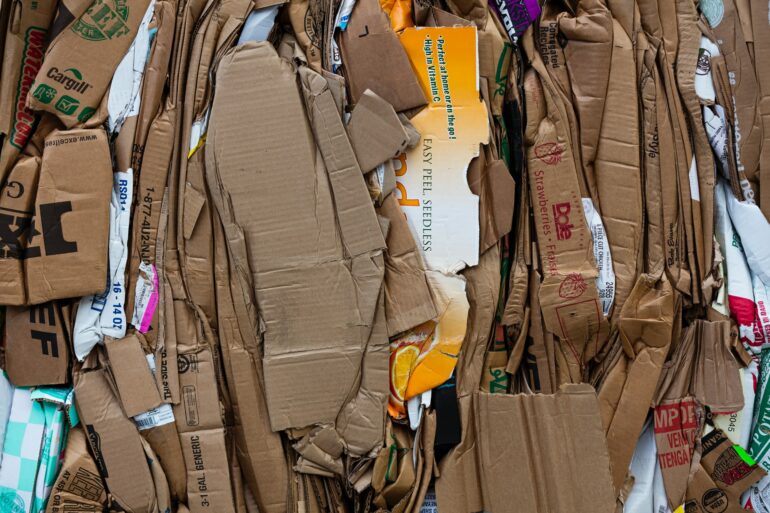Rates are rising for homeowners who take advantage of curbside recycling on a voluntary basis.
The Portage County Solid Waste Management District started raising rates a few years ago, when the recycling market went from black to red.
“The $77 we’re paying right now? That’s the cost for us to process [i.e., separate] one ton of material, regardless of what the market is,” said district Director Bill Steiner. Now, instead of receiving millions of dollars for recyclables, Portage County recycling actually pays over $400,000 to separate recyclables and forward them to a processor, he said.
Adjustable rates are built into agreements the recycling district has with numerous cities, villages and townships throughout Portage County. The voluntary customers total some 20-25 households located near enough to fixed routes that offering curbside service to them is relatively easy, Steiner said.
“We need the ability to adjust rates up or down depending on our processing costs,” Steiner said. “We’re raising rates for other communities. We’re raising rates for these people as well.”
Faced with rising costs, some of the 10 communities that have central dumpster drop-off points have already opted to remove them, severing their contracts with the recycling district. Eco-minded residents in those communities now have two options: toss recyclables in with their trash or cart it to the recycling center themselves.
Steiner said the price has not actually increased — yet.
“The true cost of providing the service per container is $4,200 per year. Those communities are paying $600,” he explained. Steiner said he is going to recommend a price hike to county commissioners, but no amounts have been set.
“Ultimately I will make a recommendation to them, and from there it will be their decision,” Steiner said. The conversations regarding rate hikes will begin Thursday with the county’s new acting finance director, David Lair.
Trash in the recycling
A worsening problem in the communities is that some people were using the dumpsters as, well, dumpsters: tossing all kinds of trash in them, not just recyclables.
With exceptions, people can discard plastic with recycling numbers 1-7 in their curbside bins, he said. However, plastic food clamshells from vendors or grocery stores are not acceptable, even if they have been cleaned out.
Also banned from the bins are vacuum cleaner hoses, plastic drain pipe, plastic bags of any kind, used paper plates, plastic silverware, plastic or paper cups, bubble wrap and nonworking Christmas lights. Yogurt containers, sour cream containers and plastic food containers even with removable lids are still considered trash, not recyclables.
Yard waste and normal every day trash are unacceptable as well. As are Styrofoam and packing peanuts, construction debris, wood, window glass, mirrors, light bulbs, batteries, electronics, appliances, hoses and cords, food waste and furniture.
Residents who wish to recycle their plastic bags may contact area Lions Clubs, which are spearheading a drive to transform those items into benches. Some area food pantries accept bags as well, as do Kent Social Services and the Center of Hope. Call ahead to make sure of details and hours of operations. Some, but not all, grocery stores have bag recycling bins, too.
Acceptable materials are all paper, newspaper, junk mail, magazines and receipts. If paper is already shredded, it should be placed in a paper bag labeled “shredding.” Cardboard must be cut down to fit inside the bin, but if customers have excess cardboard, they can stack it next to the bin. Pizza boxes must be free of grease.
Milk, juice and food cartons, even those that contained broth, are fine as long as they have been rinsed out. People can also feel fine about placing plastic or glass food containers, even with the lids on, in the bins as long as they have been thoroughly cleaned out. Those aluminum cans? Still acceptable as long as they have been rinsed of all contents.
Where the recyclables go
If the phrases “cleaned out” and “rinsed” seem repetitive, there’s a reason: only clean materials can be recycled. Otherwise, it becomes a case of “wish-cycling,” where a person tosses items that have so much food residue in them that they cannot be used.
That does happen, but Portage County is actually doing pretty well.
“On average our contamination rate is 23% right now. The national average is 25%,” Steiner said.
Steiner recognizes the need to educate county customers as to what is acceptable and what isn’t, and is working on getting the word out through social media.
Unacceptable items, meaning dirty items or items for which there is no market, are separated out before the material can be shipped to Greenstar, a recycling processor. From there, glass goes to a plant in Pittsburgh, where it is made into the reflective paint used on roadways. Cardboard goes to a paper mill. Aluminum goes to a foundry.
Contracts are constantly negotiated and renegotiated.
“Whoever’s going to pay the most money that month generally gets it, but they do have long-term agreements with some recipients,” Steiner said
All items that Portage County Solid Waste Management District accepts are recycled. None is landfilled, despite rumors that have been buzzing about for years.
“If a company that does business with Portage County wants to landfill material, they have to clear it with the district board of commissioners. We’ve never had to use that,” Steiner said.
Wendy DiAlesandro is a former Record Publishing Co. reporter and contributing writer for The Portager.

